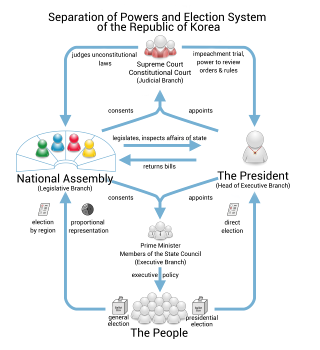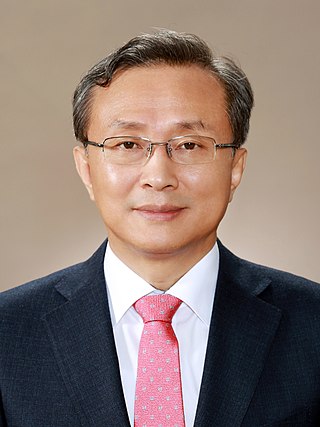
The politics of South Korea take place in the framework of a presidential representative democratic republic, whereby the president is the head of state, and of a multi-party system. To ensure a separation of powers, the Republic of Korea Government is made up of three branches: legislative, executive, and judicial. The government exercises executive power and legislative power is vested in both the government and the National Assembly. The judiciary is independent of the executive and the legislature and comprises a Supreme Court, appellate courts, and a Constitutional Court.

The Judicial Yuan is the judicial branch of the government of Taiwan. It runs a Constitutional Court and oversees all systems of courts of Taiwan, including ordinary courts like the supreme court, high courts, district courts as well as special courts like administrative courts and disciplinary courts. By Taiwanese law, the Judicial Yuan holds the following powers:

The Constitutional Court of Korea is one of the highest courts—along with the Supreme Court—in South Korea's judiciary that exercises constitutional review, seated in Jongno, Seoul. The South Korean Constitution vests judicial power in courts composed of judges, which establishes the ordinary-court system, but also separates an independent constitutional court and grants it exclusive jurisdiction over matters of constitutionality. Specifically, Chapter VI Article 111(1) of the South Korean Constitution specifies the following cases to be exclusively reviewed by the Constitutional Court:
- The constitutionality of a law upon the request of the courts;
- Impeachment;
- Dissolution of a political party;
- Competence disputes between State agencies, between State agencies and local governments, and between local governments; and
- Constitutional complaints as prescribed by [the Constitutional Court] Act.

The Supreme Court of Korea is the highest ordinary court in the judicial branch of South Korea, seated in Seocho, Seoul. Established under Chapter 5 of the Constitution of South Korea, the Court has ultimate and comprehensive jurisdiction over all cases except those cases falling under the jurisdiction of the Constitutional Court of Korea. It consists of fourteen Justices, including the Chief Justice of the Supreme Court of Korea. The Supreme Court is at the top of the hierarchy of all ordinary courts in South Korea, and traditionally represented the conventional judiciary of South Korea. The Supreme Court has equivalent status as one of the two highest courts in South Korea. The other is the Constitutional Court of Korea.

O-Gon Kwon is a South Korean jurist, best known for being one of the three judges in the trial of Slobodan Milošević. He also sat on the bench for the trial of former Bosnian Serb leader Radovan Karadžić.
Kim Yi-su is a former Justice of the Constitutional Court of Korea.

Lee Jin-sung was the 6th President of the Constitutional Court of South Korea, appointed by Moon Jae-in on November 24, 2017.
Kang Il-Won is a former Justice of the Constitutional Court of Korea. He graduated with degrees in law from Seoul National University (LL.B.) and the University of Michigan Law School (LL.M.). He was also an member of Venice Commission representing South Korea, from 2015.
Kim Chang-Jong is a former Justice of the Constitutional Court of Korea

Seo Ki-Seog is a South Korean judge. He was appointed to the Justice of the Constitutional Court of Korea in 2013
Ahn Chang-ho (Korean: 안창호) is a former Justice of the Constitutional Court of Korea.

Yoo Nam-seok was the 7th President of the Constitutional Court of Korea since 21 September 2018 to 10 November 2023. Following the vacancy of the presidency of the Constitutional Court; his position has been held since 11 November 2023 by the acting president Lee Eu-nae until the nomination of the new president in the Constitutional Court. During his tenure, he was widely perceived to be part of the court's liberal bloc, and the Constitutional Court struck down restrictions of abortion in South Korea in 2019.

Lee Seon-ae is a South Korean women jurist, who serves as Justice of the Constitutional Court of Korea since 2017. She was nominated by Supreme Court chief Yang Sung-tae and appointed by acting President Hwang Kyo-ahn. She is regarded as moderate group among nine Justices of the Constitutional Court.

Cho Yong-ho is a South Korean judge, serving as a Justice of the Constitutional Court of Korea from April 2013 to April 2019.

Lee Eunae is a South Korean judge. She was named a Justice of the Constitutional Court of Korea in 2018. On November 10, 2023, due to the resignation of Constitutional Court President Yoo Nam-seok, Judge Lee Jongseok, who had been appointed to succeed him, was delayed in the appointment process, resulting in a vacancy. Due to the vacancy of the post of President of the Constitutional Court, Senior Judge Lee Eun-ae held the post of Acting President of the Constitutional Court from 11 November 2023 until the appointment of Judge Lee Jongseok on 29 November 2023.

Lee Youngjin is a South Korean judge. He was appointed to Justice of the Constitutional Court of Korea in 2018.

Moon Hyungbae is a South Korean judge. He was named a Justice of the Constitutional Court of Korea in 2019.

Lee Mison is a South Korean judge. She was appointed to Justice of the Constitutional Court of Korea in 2019.

Park Jongmun was named the Secretary General of the Constitutional Court of Korea in 2019.

The judiciary of South Korea is the judicial branch of South Korean central government, established by Chapter 5 and 6 of the Constitution of South Korea.
















